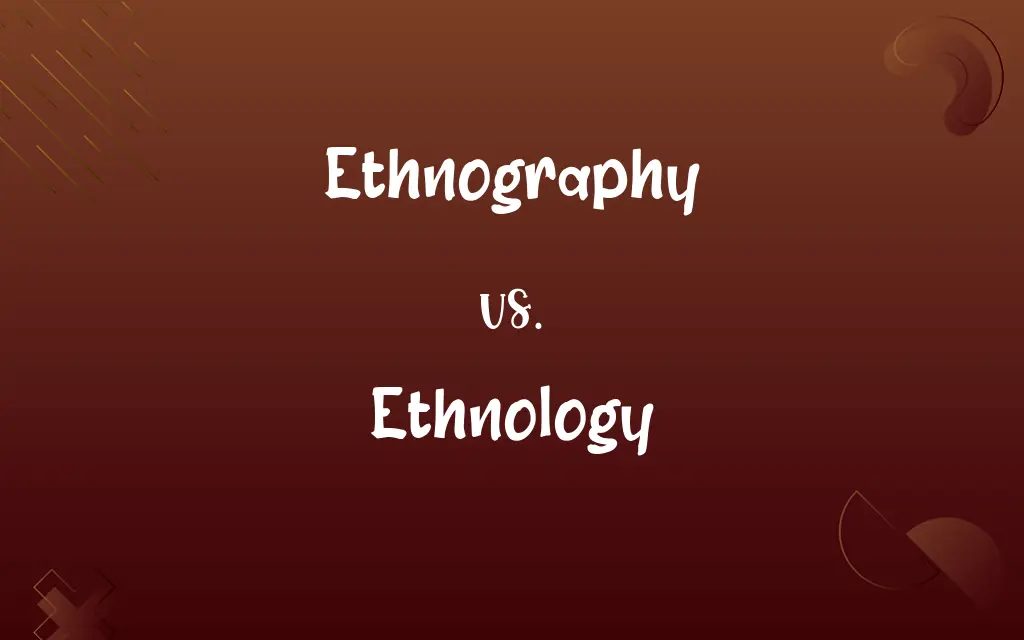Ethnography vs. Ethnology: Know the Difference

By Shumaila Saeed & Dua Fatima || Published on September 10, 2024
Ethnography involves detailed, immersive observation and participation within cultures; ethnology compares these cultural insights to understand human societies.

Key Differences
Ethnography is a qualitative research method focusing on the systematic study of people and cultures from an insider's perspective, emphasizing direct observation and participation. Ethnographers immerse themselves in the community, often for extended periods, to gather detailed insights. On the other hand, ethnology takes a broader approach by comparing and analyzing these ethnographic data across different cultures. It aims to understand the variations and universalities among human societies, drawing on the findings of multiple ethnographic studies.
Dua Fatima
Sep 10, 2024
While ethnography produces in-depth descriptions of specific cultural practices, behaviors, and beliefs through firsthand experience, ethnology synthesizes these descriptions to identify patterns, differences, and similarities across cultures. Ethnology relies on the data collected through ethnographic research to build theories about cultural evolution, social structures, and the relationships between different societies.
Shumaila Saeed
Sep 10, 2024
Ethnographers typically employ various methods such as participant observation, interviews, and documentary analysis to gather data, focusing on the nuances of social interactions and cultural norms within a single community. Conversely, ethnologists analyze this collected data, comparing it across multiple cultures to make broader generalizations about humanity.
Shumaila Saeed
Sep 10, 2024
Ethnography often results in rich, detailed narratives or case studies that provide deep insights into a particular culture's inner workings. Ethnology, on the other hand, uses these narratives to create a comparative framework that highlights the diversity and commonalities among human societies, often aiming to theorize about human behavior and culture.
Shumaila Saeed
Sep 10, 2024
The goal of ethnography is to produce a comprehensive understanding of a culture's way of life from an emic perspective, capturing the meanings and significance that community members attribute to their actions and beliefs. Ethnology, while benefiting from the emic perspective, seeks to provide an etic view by placing these cultural specifics in a broader, comparative context to understand human society as a whole.
Dua Fatima
Sep 10, 2024
ADVERTISEMENT
Comparison Chart
Focus
In-depth study of a single culture or community
Comparative analysis of cultures
Dua Fatima
Sep 10, 2024
Data Collection
Participant observation, interviews, field notes
Analysis of ethnographic studies
Shumaila Saeed
Sep 10, 2024
Primary Goal
Understand a culture from within (emic perspective)
Understand human societies (etic perspective)
Shumaila Saeed
Sep 10, 2024
Outcome
Detailed descriptions and narratives
Theories and generalizations about cultures
Shumaila Saeed
Sep 10, 2024
ADVERTISEMENT
Research Method
Qualitative, direct observation
Qualitative and quantitative, comparative analysis
Shumaila Saeed
Sep 10, 2024
Perspective
Insider view of a single community
Outsider view comparing multiple communities
Dua Fatima
Sep 10, 2024
Ethnography and Ethnology Definitions
Ethnography
Produces rich, descriptive accounts of societal practices.
Her ethnography detailed the community's marriage customs.
Shumaila Saeed
Mar 02, 2024
Ethnology
The comparative study of cultural differences and similarities.
Ethnology examines tribal societies to trace human evolution.
Hifza Nasir
Mar 02, 2024
Ethnography
Involves participant observation and interaction.
Through ethnography, researchers participate in local festivals to gather data.
Dua Fatima
Mar 02, 2024
ADVERTISEMENT
Ethnology
Combines qualitative and quantitative research methods.
Ethnological research utilized statistical analysis to compare kinship systems.
Shumaila Saeed
Mar 02, 2024
Ethnography
A method focusing on detailed, immersive cultural study.
An ethnographer lived with the tribe for a year to understand their rituals.
Shumaila Saeed
Mar 02, 2024
Ethnology
Seeks patterns and generalizations about human cultures.
Ethnology revealed commonalities in myths among disparate societies.
Hifza Nasir
Mar 02, 2024
Ethnography
Aims to capture cultures from an insider's perspective.
Ethnography enabled understanding the significance of ancient ceremonies.
Shumaila Saeed
Mar 02, 2024
Ethnology
Provides a broad understanding of humanity.
Ethnology helps explain the universal nature of religious practices.
Dua Fatima
Mar 02, 2024
Ethnography
Employs qualitative data collection techniques.
Ethnographic research in the city involved extensive interviews with residents.
Dua Fatima
Mar 02, 2024
Ethnology
Analyzes data from various ethnographic studies.
His ethnology thesis compared marriage rituals across continents.
Shumaila Saeed
Mar 02, 2024
Ethnography
The branch of anthropology that deals with the description of specific human cultures, using methods such as close observation and interviews.
Shumaila Saeed
Mar 01, 2024
Ethnology
The branch of anthropology that analyzes and compares human cultures, as in social structure, language, religion, and technology; cultural anthropology.
Shumaila Saeed
Mar 01, 2024
Ethnography
That branch of knowledge which has for its subject the characteristics of the human family, developing the details with which ethnology as a comparative science deals; descriptive ethnology. See Ethnology.
Dua Fatima
Mar 01, 2024
Ethnology
The science which treats of the division of mankind into races, their origin, distribution, and relations, and the peculiarities which characterize them.
Shumaila Saeed
Mar 01, 2024
Ethnography
The branch of anthropology that provides scientific description of individual human societies
Hifza Nasir
Mar 01, 2024
Ethnology
The branch of anthropology that deals with the division of humankind into races and with their origins and distribution and distinctive characteristics
Dua Fatima
Mar 01, 2024
Repeatedly Asked Queries
How does ethnology differ from ethnography in its approach?
Ethnology differs from ethnography in that it uses a comparative approach to analyze and understand the differences and similarities across cultures, rather than focusing on a single group.
Shumaila Saeed
Sep 10, 2024
What kinds of methods do ethnographers use?
Ethnographers use methods such as participant observation, in-depth interviews, and analysis of documents and artifacts to gather data.
Dua Fatima
Sep 10, 2024
Why is participant observation important in ethnography?
Participant observation is important because it allows researchers to gain a deep understanding of a culture's practices and beliefs from an insider's perspective.
Dua Fatima
Sep 10, 2024
Can ethnology be conducted without ethnographic studies?
While theoretically possible, ethnology typically relies on data from ethnographic studies to conduct its comparative analyses, making ethnography foundational to ethnological research.
Shumaila Saeed
Sep 10, 2024
What is the main goal of ethnography?
The main goal of ethnography is to understand and describe a culture from the insider's perspective through immersive observation and participation.
Dua Fatima
Sep 10, 2024
How do ethnologists analyze data?
Ethnologists analyze data through comparative methods, looking for patterns, differences, and similarities among the cultures studied in ethnographies.
Dua Fatima
Sep 10, 2024
What can be a potential outcome of ethnological study?
A potential outcome can include general theories about human behavior, cultural evolution, or social structures, based on comparative cultural analyses.
Hifza Nasir
Sep 10, 2024
How do ethnographic studies handle ethical concerns?
Ethnographic studies handle ethical concerns by obtaining informed consent, ensuring confidentiality, and respecting the community's values and norms.
Shumaila Saeed
Sep 10, 2024
How does ethnography benefit ethnology?
Ethnography provides the rich, detailed data that ethnology needs for its comparative analyses and theoretical developments.
Dua Fatima
Sep 10, 2024
Can ethnography and ethnology be considered purely objective?
While striving for objectivity, both fields recognize the influence of the researcher's perspective and aim to mitigate bias through various methodological approaches.
Hifza Nasir
Sep 10, 2024
What is an emic perspective in ethnography?
An emic perspective seeks to understand culture from the point of view of the insiders or members of the culture itself.
Hifza Nasir
Sep 10, 2024
What is an etic perspective in ethnology?
An etic perspective analyzes cultures from an outsider's viewpoint, comparing them to draw general conclusions about human societies.
Shumaila Saeed
Sep 10, 2024
Are ethnography and ethnology limited to studying primitive or remote cultures?
No, both fields study a wide range of societies, including modern, urban, and technologically advanced communities.
Hifza Nasir
Sep 10, 2024
Can ethnology contribute to solving global issues?
Yes, by highlighting cultural similarities and differences, ethnology can contribute to cross-cultural understanding and address global issues like conflict, inequality, and cultural preservation.
Shumaila Saeed
Sep 10, 2024
How has technology impacted ethnographic research?
Technology has expanded the tools available for ethnographic research, enabling virtual ethnography and the analysis of digital cultures, though it also raises new ethical considerations.
Shumaila Saeed
Sep 10, 2024
Share this page
Link for your blog / website
HTML
Link to share via messenger
About Author
Written by
Shumaila SaeedShumaila Saeed, an expert content creator with 6 years of experience, specializes in distilling complex topics into easily digestible comparisons, shining a light on the nuances that both inform and educate readers with clarity and accuracy.
Co-written by
Dua Fatima






































































